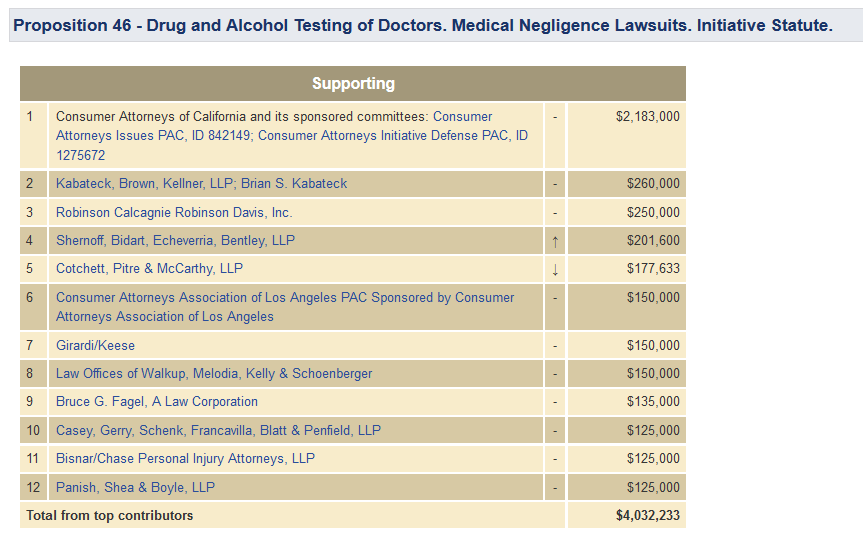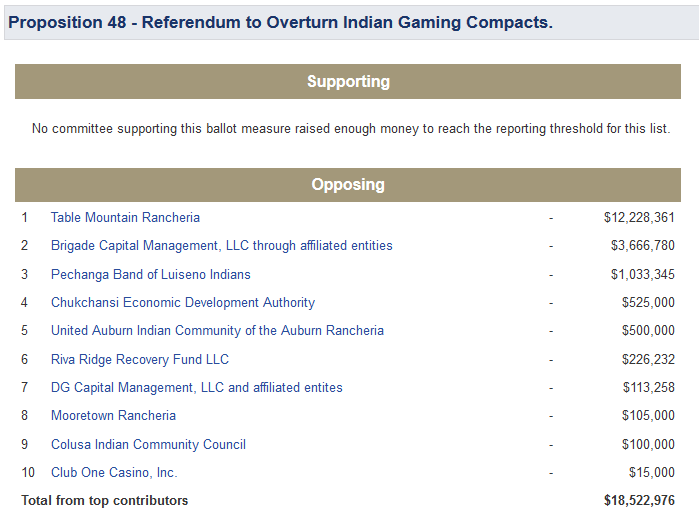![[Steve Friedl Logo]](/images/unixwiz-logo-140x80.gif)
This site uses advanced css techniques
Each election I research and analyze the propositions on the California ballot to create this voting guide, and they represent nothing other than my own personal view of these measures. I do this analysis on a non-partisan basis, but that doesn't mean I have no opinion. I do, but I believe it's transparent (note that transparency means only that I claim no hidden agenda, not that I'm trying to be unbiased).
I generally have no connection with any group supporting or opposing any of these propositions.
My main intent is to get to the bottom of these issues, knowing that the real purpose is not always evident. Once uncovered, I apply a mainly libertarian eye to them.
I'm more interested in examining the issues thoughtfully than I am in getting you to vote the way I do, so I hope these pages help you understand the issues in front of us.
I hope my thoughts are helpful.
Other resources:
Click each link for the rationale for each position.
| Proposition | My Position | Description / Title |
|---|---|---|
| |
Yes | Water Bonds |
| |
Yes | Budget Stabilization Account |
| |
No | Insurance Commissioner / Health Insurance Rates |
| |
No | Drug testing of doctors; Medical tort reform |
| |
Yes | Criminal sentencing reform |
| |
No | Indian Gaming Compacts |

This measure would authorize around $7.5B in bonds to support a number of long-term water projects, mainly surrounding the construction of dams and groundwater replinishment/recovery systems, and protection of watersheds. There are ancillary projects related to environmental protection, flood control, groundwater cleanup, habitat restoration, and the like.
This measure has been in the works for many, many years, and it seems that all the planets aligned for introduction now: the parties all mostly agreed, and there's a lot to be said for good timing. Even though the Prop 1 projects won't have any impact on the current drought - construction on this level takes many, many years — gotta hand it to them for striking while the iron is hot.
Opposition seems to be fragmented and far less coherent than I'm used to against a bond measure, and making relatively unpersuasive arguments.
The worst argument, by far, is "It won't do anything about the drought now", which is something everybody agrees with. It takes years (but probably not decades) to build this kind of infrastructure, and the proponents are simply striking while the issue is in the public mind.
The opponents also claim that building storage facilities (dams) is the wrong answer, we should be seeking more short-term conservation and reclamation, and though I agree we should be doing those things, I simply don't believe this will take care of our water problems.
There's the more legitimate argument that users of the water - who I think are farmers in the central valley, who get water for agriculture at very cheap rates - aren't willing to pay for it. It's not clear to me why growers in regions without abundant water ought to be subsidized by the rest of us, but this gets entangled in a whole history of water rights and intergovernmental squabbles that get seriously intense: it hurts my head thinking about them.
"Whiskey is for drinking, water is for fighting over." — widely attributed to Mark Twain but almost certainly not said by him
The proponents of this bond measure, like all of their ilk, claim "Does not raise taxes" — which is as disingenuous as claiming that using a credit card is not actually spending money — but at least they had the decency not to put it in ALL CAPS.
The only real opposition I can find to this are folks who are up in arms about some huge tunnels to be built up near the Sacramento Delta, arguing strongly negative environmental effects on the rivers there. These arguments seem genuine and without any obvious alternate agenda, and I accept they are made in good faith. THis is probably one of those messy compromises that have to be made in a project this big, where not every gets what they want.
I can't remember the last time I supported a bond measure, but I support this one.
Though I hate the idea of borrowing more money, this is exactly the kind of project for which bond measures are legitimate: big-picture projects that have to be funded all-or-nothing. It's hard to argue that California doesn't have to do something about securing a consistent water future, and though I suppose one could take issue with the specific plans (where to build a tunnel or a dam), people I trust say this is solid water policy, so I can back this.
My vote: Yes
This measure would replace the rainy day fund established in 2004 (by Prop 58) with one putting aside 1.5% of general-fund revenues each year, with somewhat more restrictions on access to the money, as well as being harder to avoid putting the money aside.
The amount put aside each year is less that Prop58 levels, but previously the governor could suspend this just by waving his hand (which he's done most years since 2004). This measure would require him to declare a "budget emergency" and have it approved by the legislature before suspending contributions or using the money. It's hard to tell whether this would be actually more difficult to do.
This measure would (among other things) set up a statewide reserve fund for education, as well as limit what local school districts could keep in their own reserves. I'm not entirely clear what the purpose for the limitation on the local reserve is about, but it's clearly the controversial issue in this measure.
Education proponents are all up in arms about this, mainly from a group "Educate our State", which appears to have been around for a few years, and claiming to be a grassroots parent-led organization. I was fully prepared to find that these folks are just a front for the teachers' unions, but I don't think that's the case. They make a surprisingly good case for a group that doesn't seem to have any funding.
The most persuasive argument they've made is that this is a shift of school budgets (at least their reserves) from the local level to the state level, something that almost always reduces control of the parents in that district. They also point out that larger local reserves are necessary to get around budget games that the State plays, something that's very easy to believe.
However, none of this reserve-limitation kicks in until the state actually funds the state-level reserve, soemthing that's not expected to happen for a number of years, and there are technical reasons why this may never come to pass at all, meaning this is a concern of almost nothing.
The fact that this measure passed in the legislature unanimously, and that there wasn't a single political action committed formed to oppose it, all make me a little nervous. If this were so bad for the schools, I'd imagine the teachers' union would be all over it, but so far I can't find their hands on any of it.
But in spite of my reservations about the school reserve issue, I'm going to cautiously support it, hoping I've not missed something sneaky.
My vote: Yes
This measure would give the State's elected Insurance Commissioner the power to accept or reject changes to some health-insurance plans, including rate changes and possibly benefit or deductible levels. There are other minor provisions as well, but nobody cares about those: this is about the insurance commissioner.
Note: I'll use "rates" as a shorthand for the whole package of premium, deductible, and benefits because that's what's in play here (though there's some question whether the Commissioner would actually get power over things other than rates).
Currently there's a mishmash of regulation of the health insurance market:
The proponents claim that getting the Insurance Commissioner involved in all the individual and small-group plans will protect consumers, and the current guy in office (Dave Jones) is enthusiastic about this measure, as he stands to gain a great deal of power here.
The main backer is Consumer Watchdog, a group of self-styled "consumer advocates" that was heavily involved in a similar effort for auto insurance (Harvey Rosenfield, Prop 103), and they get no small amount of their income as "intervenors" who sue on behalf of consumers about rate hikes that are seen as unfair. They'll be able to do the same here for rate increases above a certain point, and this money stream is a big draw for them and the attorney groups who are also backing this measure.
Opposing this measure are the insurance carriers, which is a surprise to nobody, and their contributions dwarve those of supporters by a large margin. Proponents say it's because the carriers don't want anybody interfering with rapacious rate increases — and certainly some of that is true — but the prospects of lawsuits by these "consumer activists" must enter the mix too.
I oppose this entirely.
Adding another layer of bureaucracy to the market cannot but help to make things worse, and since pre-existing conditions are no longer excluded (due to Obamacare), people are free to shop around for a plan that works for them, including cost/benefit tradeoffs. Folks who buy through the exchanges already have government bureaucrats looking after rates and plans, so it's not clear who this is mainly meant to benefit.
My guess: the lawyers (also known as "consumer advocates"), who stand to cash in on a new wave of lawsuits challenging any and all rate increase. I'm not sure how the mechanics of these challenges and appeals work, but I don't doubt that the lawyers do and know how to work it to their best advantage.
The opposition points to this putting all the power in the hands of one elected official, and this smells like exactly the kind of magnet for corruption and gamesmanship that we fear in big government. The proponents claim:
Said by the proponents:
"No insurance commissioner has accepted campaign contributions from insurance companies since 2000."
There are enough ways that this statement could be gamed that I simply do not believe it's true in practice, and that it's foolish not to worry about political grandstanding on this issue.
This measure is also backed heavily by the California Nurses Association, an activist union that sticks their noses in pretty much every big political issue in this State.
Curiously, this measure is strongly opposed by Nancy Pelosi, who believes it will undermine Obamacare. Strange bedfellows...
My vote: No

This measure would do a number of things related to medical care and liability:
Let's take these each in turn:
Prescription drug database: The statewide Rx database currently requires pharmacies to submit information to the database, but nobody is required to check it (though some do). This measure would require that a pharmacist processing a new prescription for a controlled drug check for some other prescription of the same kind, and if there's apparent overlap, make a determation whether there is a legitimate need or not.
The measure doesn't say exactly what "determine whether there's a legitimate need", but I presume it might mean contacting both prescribing doctors with a heads up. If neither one of them knew of the other, the doctors themselves would likely put the kibosh on them.
The measure claims to reduce healthcare costs by avoiding spending on these abused drugs, as well as for the effects of abuse (accidents, law enforcement, etc.). It seems to me that folks denied access via the prescription system will have no trouble finding their hit on the street.
Pain-and-suffering limit: Though there are no limits on actual economic losses (medical care, lost wages, etc.), non-economic losses such as pain-and-suffering have been capped at $250k since 1975, and it's hard to argue that this limit still ought to apply. Adjusted for inflation since 1975, the current limit would be around $1.1M, and this would automatically be adjusted thereafter without need for legislative action.
Mandatory Reporting: This is clearly trying to get medical professionals to police themselves: anybody can make a report now, but this measure would require it of doctors and encourage it from anybody else (I imagine nurses would be in a good position to report on suspicions of a doctor being buzzed while in the O.R.).
There's no clear standard here, what kind of behavior rises to the level of genuine suspicion, but in any case, those reporting others in good faith are protected from retaliation.
I imagine this will be a difficult section to enforce.
Drug testing: This measure would require hospitals to administer tests to physicians affiliated with them, checking for marijuana, cocaine, amphetimines, opiates, PCP, and alcohol. Three things trigger the test:
All tests would be paid for by the doctor, and could not be billed to a patient or an insurance carrier. Refusing to take a test incurs penalties as you'd expect.
This measure only applies to hospitals and outpatient surgery centers (the definition of which mostly revolves around whether they administer general anesthetic). This effectively exempts your local doctor's office and the walk-in clinic.
The idea is that you worry about high-risk situations — such as surgery — and don't worry so much about an office visit with your family doctor (that prostate exam is not likely to maim you for life).
This measure is formally known as the "Troy and Alana Pack Patient Safety Act of 2014", named for two kids killed by a driver impaired on vodka and Vicodin, the latter clearly obtained by doctor shopping. The parents look to be honorable folks, true believers who helped get the Rx database off the ground some years ago, hoping to prevent somebody else from suffering the same horrible tragedy that befell them.
But, sadly, they're being used by the trial lawyers, who are by far the big money behind this measure (source: CA Secretary of State):

Contingency fees are limited by statute to 40% of the first $50k, scaling down to 15% of anything over $600k. Raising the pain-and-suffering limit means attorneys can recover $217k (with the $1.1M limit), up from $74k with a $250k limit (I was surprised that the percentage limits weren't raised too).
The drug testing weighs into this too: the statute says that a doctor failing a drug test (or who fails to take one) will be presumptively negligent, which plays right into the court case that follows.
I don't mind doctors being held to account for their mistakes, especially ones that are grossly negligent (surgery while drunk), and pretty much the only way to take on a doctor is with an aggressive contingency lawyer, so they ought to be paid too.
But this whole measure is just over-the-top cynical, with concern for patient health a by-the-way compared with the trial lawyers and "consumer advocates" trying to line their pockets.
My vote: No

Not all crimes are created equally, with felonies being the most serious, infractions the least serious, and misdemeanors in the middle, and penalties correspond to seriousnes. Some crimes are defined as "wobblers", which give the prosecutor the discretion to charge as felony or misdemeanor depending on the circumstances of the crime.
This measure would reduce the charging category of a number of non-serious, non-violent crimes, as well as un-wobble some crimes by removing prosecutorial discration, and then use the money saved to pay for various crime-prevention purposes.
Note: prisons are run by the state for serious criminals and longer sentences, while jails are run by local juridictions for smaller crimes and shorter sentences. For this section I'm mostly going to use them interchangeably.
This is the discussion of the crimes involved, noting the current rules and what's proposed. All of them have exceptions that essentially remove the "downgrading" if the perp has previous crimes related to the current offense. The details vary and I'm going to skip over some of the finer points of exceptions.
Furthermore, those convicted as felons under the old guidelines can petition the court for sentence reductions if the circumstances warrant (say, a shoplifter of $800 of merchandise convicted of a felony). The judge has pretty wide discretion here to release or retain the criminal, and may decline to reduce the sentence if the judge feels that the person is a danger to re-offend.
Even folks who have been released already can petition to have their convictions reduced from felony to misdemeanor to clear up their permanent record. But curiously, even though they will no longer considered felons, they are nevertheless explicitly prohibited from owning or possessing a handgun (as if they are still a felon).
None of this applies if the person has a previous conviction for a serious or violent offense (rape, murder, etc.) or is a registered sex offender.
The intent is to reduce attention paid to non-serious, non-violent offenses, leaving the justice system (and jail system) more able to deal with the really bad guys. This will presumably save subtantially on the costs of incarceration, and the savings go to a fund aimed at:
I support this measure.
Prop 47 appears to do exactly what it says it does, with no hidden agenda or surprises that I can find, and the folks for and against seem to be advocating in good faith. For once, this really is about the merits of the measure, a welcome respite from the cynical posturing we see so often.
Opposition is mainly lead by the Chiefs of Police, who point to unintended consequences:
These are all fair points, but I still support the measure. Putting people who are not a serious danger to others often turns them into people who are a serious danger to others.
The reduction in penalty for drug possession is, in my view, the single biggest benefit of this measure: these people do not belong in jail at all.
My vote: Yes

Indian tribes have a special status in Federal law, a kind of quasi-sovreignty that shields them from State interference, but they nevertheless can't operate casinos with negotiating with the state. This measure would ratify an agreement between the State and two bands of Indians, allowing them to run a casino together.
These compacts typically require payments to the state to simulate the corporate tax rate, costs associated with the casinos being there (law enforcement in the surrounding area, for instance), as well as a kind of revenue sharing with other Indian tribes that don't operate casinos themselves.
This involves the Wiyot Indians in the northwestern corner of California, as well as the North Fork band of Mono Indians near Madera, who are working together to build a casino, not on the original reservation lands, but on newly-dedicated Indian land ~30 miles away that's way more convenient to casino-goers.
It's this latter part that's generating much of the controversy, with claims of "reservation shopping". We have to look into this a bit more.
Traditionally, the Feds didn't allow casinos on land that wasn't in Indian hands by 1988 (per the Indian Gaming Regulatory Act), though they can make an exception for the good of the tribe and if it wouldn't be bad for the surrounding area. That exception was used here, as the location of the casino (just off Ave 17 and the 99 Freeway in Madera) wasn't dedicated to the Tribe until recently (2012). The Tribe claims this is part of their ancestral lands, a claim that holds some merit.
Most Indian casinos are way off in the middle of nowhere, so the proposed location right off highway 99 would be a prime location for those living in the central valley.
The main opponents, surprisingly enough, are other Indian tribes who stand to lose to the new competition. The biggest money, by far ($12M), comes from the "Table Mountain Rancheria", which appear to be a related band of Mono Indians, and who operate a casino not far away (it's 26 miles as the crow flies, but much, much farther to drive).
Going down the list of other donors to the opposition shows investment bankers and other Indian tribes, including the Pechanga Indians, who are almost 300 miles away in Southern California. Only the last one (a card club) is unrelated to an Indian tribe or casino (Source).

But wait: why are we voting on this in the first place?
The compact has already been approved by the Governor, the Feds, and the California legislature (AB277), and there are existing agreements with the local governments near the proposed site. It's a done deal, right?
Nope: other tribal groups, who don't want competition, launched this referendum (Prop 48) to overturn the law, and are heavily funding the opposition.
This is incredibly cynical, and it really depresses me.
Indians have been treated atrociously by the white man over the last coupla hundred years and it's hard to not feel sympathy for their plight. Their languages are disappearing, their culture is being assimilated, and they're seen as a quaint legacy of the past.
Who'd not want to help them, either out of a sense of compassion, or a sense of inherited guilt?
But I don't believe this really helps the tribal peoples it means to help. In California, at least, the Casinos are generally operated by Las Vegas concerns (who have experience with this kind of thing), and employment of tribal peoples is minimal.
And this election cycle I've learned that Wall Street investment interests are involved too, providing the financial backing to operate these things (what Indian tribe has $500M lying around to start a casino/resort)?
Is this really about helping the Indians reverse a generation (or two) of social malaise (unemployment, substance abuse, social isolation), or is it about something else? And even if, after sonall that, I am still determined to help the Indians, I find out that they're not even willing to help each other.
Sadly, when the Indians play screw-the-Indians too, it's probably not about helping the Indians.
My vote: A sad No
Those discovering bad/missing links, typos, or even errors in judgment are encouraged to report them to me: steve@unixwiz.net
Last updated: Sun Nov 2 18:15:50 PST 2014